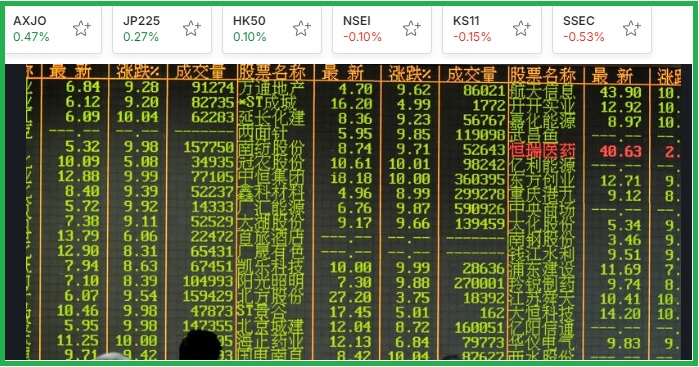
(Photo : Asian markets)
- Asian stocks marginally rose on Tuesday, following Wall Street's rally, despite concerns about China's economy.
- The market is awaiting U.S. inflation data to gauge the pace of the Federal Reserve's rate cuts.
- If inflation data deviates from expectations, it could alter the number of anticipated rate cuts, leading to market volatility.
- Concerns over China's struggling economy, indicated by weak consumer inflation and worsening producer price deflation, continue to impact global markets.
Asian stocks have shown a marginal rise on Tuesday, reversing early losses, following Wall Street's overnight rally. However, concerns about China's struggling economy have kept investor sentiment in check. The MSCI's broadest index of Asia-Pacific shares outside Japan was last up 0.2%, after falling 1.11% in the previous session to hit a one-month low. Japan's Nikkei last traded 0.4% higher, helped by gains in financial and consumer names.
Wall Street staged an impressive rebound overnight, with all three major U.S. stock indexes surging more than 1%, recovering from last week's sell-off. Economists at ING noted that the risk-off sentiment stabilized overnight and U.S. equities rebounded on dips buying after Friday's sell-off. The market is now looking to the U.S. inflation data to understand the pace of the Federal Reserve's rate cuts.
The U.S. inflation data is due on Wednesday, with expectations for the headline number to have further slowed to an annual 2.6% in August. Jun Bei Liu, a portfolio manager at Tribeca Investment Partners, noted that if the inflation number is any different, or significantly different from expectations, then the number of rate cuts (priced in) will be changed.
Fed's Rate Cuts and Market Expectations
The market's current expectation is that the US Federal Reserve will ease rates when it meets next, with a 29% chance of an outsized 50-basis-point cut priced in for the near future. Over the rest of the year, about 110bps worth of cuts are anticipated. This expectation is significant because interest rate decisions directly impact borrowing costs, consumer spending, and overall economic activity. If the Fed follows through with these cuts, it could stimulate the economy by making borrowing cheaper, potentially boosting stocks and other risk assets.
However, if inflation data deviates significantly from expectations, it could change the number of rate cuts priced in, leading to market volatility as investors adjust their expectations. A more aggressive rate-cutting cycle could signal economic weakness, while less dovish action might suggest a stronger economy, but also less support for risk assets.
The US inflation data is crucial because it directly influences the Federal Reserve's monetary policy decisions. If the inflation data on Wednesday shows a further slowdown to an annual rate of 2.6% as expected, it would support the case for the Fed to continue with interest rate cuts, as it suggests that price pressures are easing, giving the central bank room to stimulate the economy.
Concerns Over China's Struggling Economy
In Asia, concerns over China's growth outlook cast a cloud over markets, after data on Monday showed the country's consumer inflation accelerated in August to the fastest pace in half a year but domestic demand remained fragile, and producer price deflation worsened. This sent Chinese stocks sliding to seven-month lows in the previous session while the yuan came under pressure on renewed calls for further stimulus measures from Beijing to prop up its economy.
The main concern for investors regarding the Chinese economy is its ongoing struggle, as indicated by data showing weak consumer inflation and a deteriorating producer price deflation. This signals persistent challenges in domestic demand and overall economic activity.
Given China's size and its role as a major global growth driver, any slowdown there can have significant ripple effects on the global market. It could lead to reduced demand for commodities and exports, impacting countries and industries that rely on Chinese trade.









